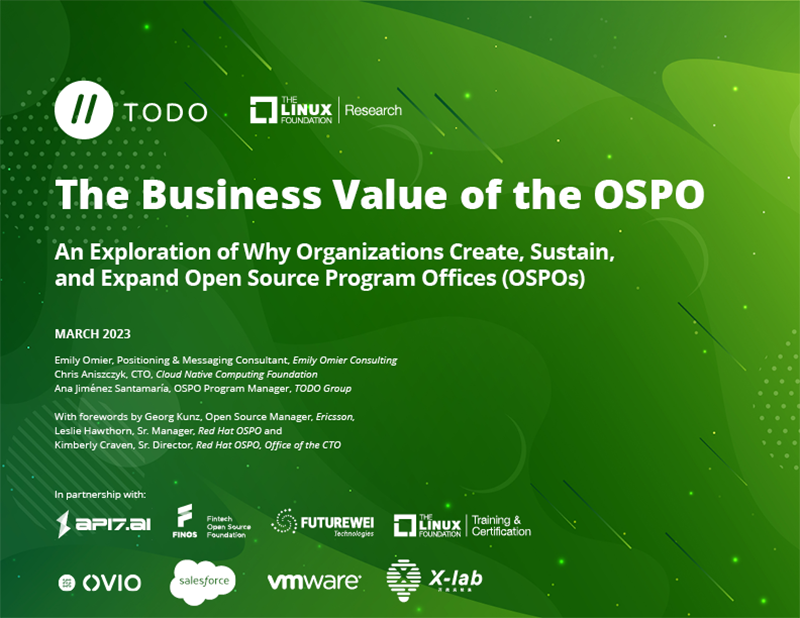Understanding the business value of the OSPO
The Linux Foundation | 03 May 2023

Open source software has become ubiquitous in the technology field, and organizations are realizing the benefits of working with open source projects and communities. To ensure the sustainability and growth of these projects, as an organization, it's crucial to provide them with the necessary support, including funding, contributions, and the implementation of open source best practices.
Investing in direct engagement with these communities can foster healthy and sustainable relationships. This is where Open Source Program Offices (OSPOs) come in. Such offices can help nurture and build sustainable open source projects while promoting the organization's open source culture through education and best practices.
The recent TODO Group and Linux Foundation Research report, "The Business Value of the OSPO," waves in perspectives from OSPO leaders around the world and various industries on what makes an OSPO valuable, how they measure and communicate that value across different team needs, and how they expect their program to evolve with their organization.
Here are some key takeaways about OSPOs as learned from their leadership:
- An OSPO serves as a vital bridge between an organization and the open source community, helping to ensure that the organization is a good steward of open source software and can reap the benefits of open source adoption while minimizing risks.
- The OSPO's strategy aligns its open source goals with overall organizational objectives.
- The people behind the OSPO enable an organization to start to have an "open source" strategy and preserve it.
- Each OSPO is unique and must define its goals, success metrics, and approaches to engagement.
- OSPOs drive compliance, standardization, reputation, knowledge sharing, development speed, security, and sustainability in businesses.
- The flexibility and bi-directional nature of the OSPO's mission make it the foundational strategic lynchpin of an organization's technology approach.
- OSPOs enable collaboration and co-creation and act as stewards of industry-wide best practices.
- An OSPO must act as a conduit and connective tissue between each stakeholder group, ensuring that the interests of all parties are heard and considered.
- OSPOs face challenges like culture, education, and defining success.

With the growing adoption of open source across different industries, organizations must advance in the stages of open source consciousness to take responsibility, which OSPOs help to achieve, providing and maintaining a framework that covers the following aspects: strategy, governance, compliance, and community engagement.
OSPOs enable collaboration and co-creation, act as stewards of industry-wide best practices, and provide a conduit for change agency as organizations evolve in the ever-changing market landscape. By investing in OSPOs, organizations can work with project communities, maintainers, and external collaborators to achieve mutual benefit.
